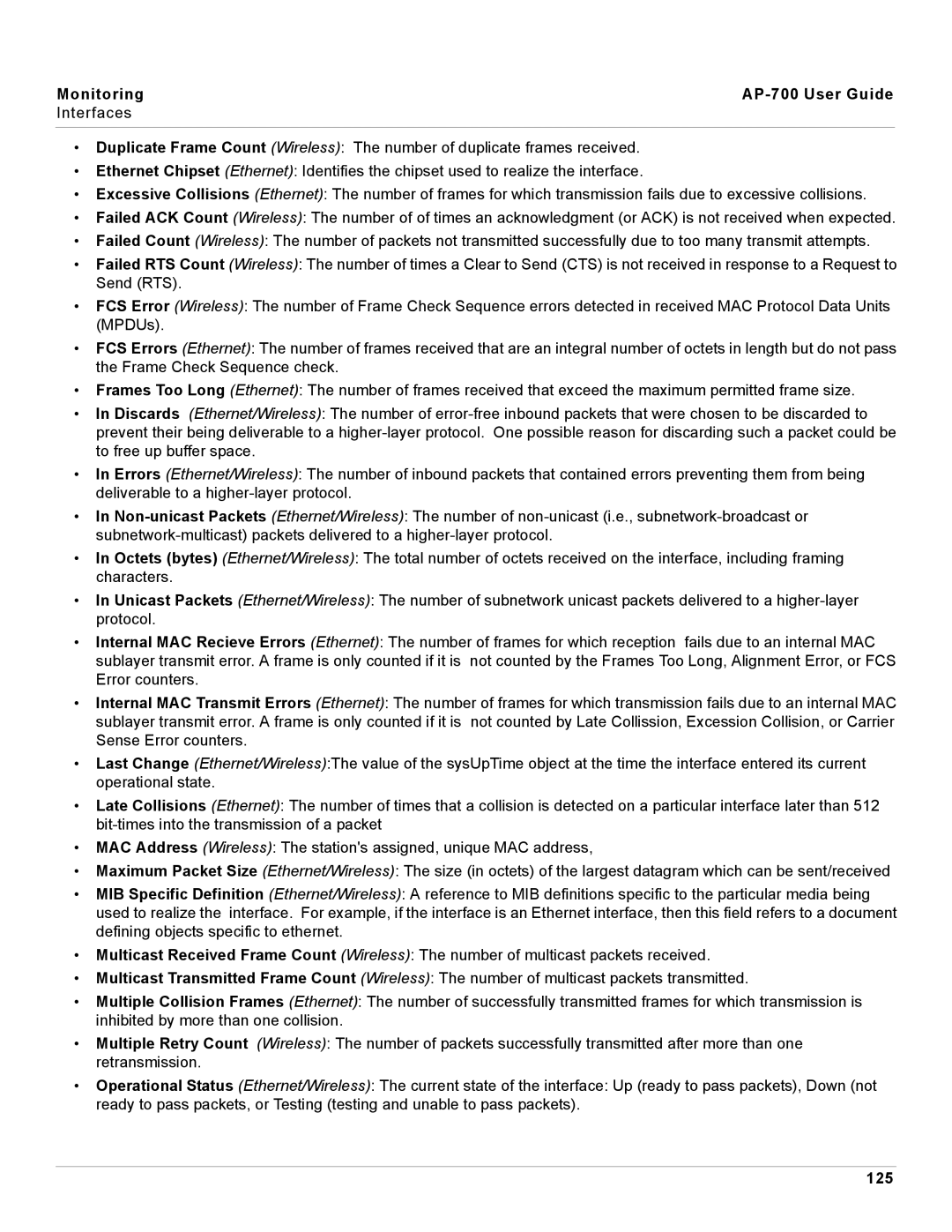Monitoring |
|
Interfaces |
|
|
|
•Duplicate Frame Count (Wireless): The number of duplicate frames received.
•Ethernet Chipset (Ethernet): Identifies the chipset used to realize the interface.
•Excessive Collisions (Ethernet): The number of frames for which transmission fails due to excessive collisions.
•Failed ACK Count (Wireless): The number of of times an acknowledgment (or ACK) is not received when expected.
•Failed Count (Wireless): The number of packets not transmitted successfully due to too many transmit attempts.
•Failed RTS Count (Wireless): The number of times a Clear to Send (CTS) is not received in response to a Request to Send (RTS).
•FCS Error (Wireless): The number of Frame Check Sequence errors detected in received MAC Protocol Data Units (MPDUs).
•FCS Errors (Ethernet): The number of frames received that are an integral number of octets in length but do not pass the Frame Check Sequence check.
•Frames Too Long (Ethernet): The number of frames received that exceed the maximum permitted frame size.
•In Discards (Ethernet/Wireless): The number of
•In Errors (Ethernet/Wireless): The number of inbound packets that contained errors preventing them from being deliverable to a
•In
•In Octets (bytes) (Ethernet/Wireless): The total number of octets received on the interface, including framing characters.
•In Unicast Packets (Ethernet/Wireless): The number of subnetwork unicast packets delivered to a
•Internal MAC Recieve Errors (Ethernet): The number of frames for which reception fails due to an internal MAC sublayer transmit error. A frame is only counted if it is not counted by the Frames Too Long, Alignment Error, or FCS Error counters.
•Internal MAC Transmit Errors (Ethernet): The number of frames for which transmission fails due to an internal MAC sublayer transmit error. A frame is only counted if it is not counted by Late Collission, Excession Collision, or Carrier Sense Error counters.
•Last Change (Ethernet/Wireless):The value of the sysUpTime object at the time the interface entered its current operational state.
•Late Collisions (Ethernet): The number of times that a collision is detected on a particular interface later than 512
•MAC Address (Wireless): The station's assigned, unique MAC address,
•Maximum Packet Size (Ethernet/Wireless): The size (in octets) of the largest datagram which can be sent/received
•MIB Specific Definition (Ethernet/Wireless): A reference to MIB definitions specific to the particular media being used to realize the interface. For example, if the interface is an Ethernet interface, then this field refers to a document defining objects specific to ethernet.
•Multicast Received Frame Count (Wireless): The number of multicast packets received.
•Multicast Transmitted Frame Count (Wireless): The number of multicast packets transmitted.
•Multiple Collision Frames (Ethernet): The number of successfully transmitted frames for which transmission is inhibited by more than one collision.
•Multiple Retry Count (Wireless): The number of packets successfully transmitted after more than one retransmission.
•Operational Status (Ethernet/Wireless): The current state of the interface: Up (ready to pass packets), Down (not ready to pass packets, or Testing (testing and unable to pass packets).
